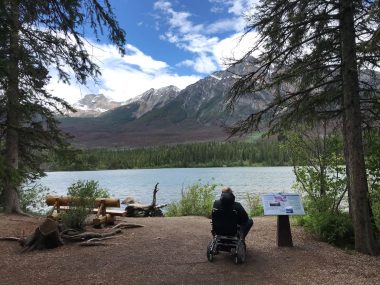How I Learned to Listen to Unspoken Words as We Lived With ALS
A caregiver finds that empathy and observation lead to better understanding

My late husband, Jeff, had a motorized scooter that gave us the freedom to move and travel as his ALS progressed during the summer of 2019, our first full summer living with the condition. The scooter was one of the first things Jeff ordered from Amazon as his gait became unstable, deciding on the collapsible version to provide more portability.
Jeff had made the scooter decision on his own terms and when he felt ready, and it was perfect timing for a June trip with friends to Alberta, Canada. The scooter was rugged enough to navigate the gravel paths of Banff National Park, nimble enough to take into crowded restaurants, and speedy enough to help Jeff get through the airport faster than I could. I could break it down into two parts and load it easily into the trunk of a car.

Jeff enjoys a mountain view in Alberta, Canada, in June 2019. (Photo by Juliet Taylor)
Looming ahead someday, we both knew, was a larger power wheelchair that would offer greater support for his weakening body. While a power chair would bring Jeff continued freedom and dignity, harder was the knowledge that it meant his ALS was progressing.
ALS is an erratic series of ongoing losses of physical strength, some more brutal than others. Getting around and staying as active as possible was crucial to Jeff’s well-being. And to me, this meant that getting the 425-pound power wheelchair from place to place was equally important.
We both knew a mobility van was coming. I found myself noticing them on the roads and saw that Jeff did, too.
I quietly started researching vans, evaluating side ramp versus rear ramp, safest restraint systems, and most reliable manufacturers. Jeff’s quality of life would depend on these decisions, enabling us to get to clinic appointments, visit family in Michigan from our home in Maryland, and go to the park for our regular visits.
On a trip to Michigan, I noticed a highway billboard advertising a factory showroom filled with new and used mobility vehicles. I made a mental note to call before our next visit, and a few weeks later, we had an appointment.
We went to dinner the evening before, sitting outside at a riverside bar in Battle Creek, enjoying live acoustic music. We parked the scooter by a railing, and I supported Jeff as he transitioned to a patio chair. The patio was dog-friendly, Jeff had a beer, and life felt, for a few hours, just like the days before ALS. These moments of relative normalcy were important to both of us, and we sought them out throughout Jeff’s illness.
The next day, we spent several hours at the mobility van dealership, exploring vehicles with various features before choosing a modest Dodge Grand Caravan that was in our price range. The salesman was patient and not pushy. His starting offer was reasonable, and I felt relief knowing that we’d have a van, and thus a valuable way for Jeff to stay active.
There was just one factor in the van decision that I hadn’t yet considered, and it’s the one thing — the main thing — I wish I’d better understood at the time.
Jeff wasn’t ready.
My strong, capable husband didn’t want a mobility van just yet. We knew it was coming, yes, but that summer, we didn’t need it. We were busy seeing the Rolling Stones and Bob Seger and Queen. We were taking our dog, Rudder, to the dog beach, and we were boating. Jeff was mowing our lawn — and the neighbor’s — with our riding mower.
Jeff was the talented, brawny guy who built his best friend’s kids a tree house. He’d won bicycle races. He’d always been exceptionally physically strong. He had emotional fortitude, too. In his professional life in law enforcement, he’d led the responses to countless emergency situations. He was the planner, the thinker, the strategist — and he wasn’t ready for a van.
As we sat in the sales office and I noticed Jeff’s increasing hesitation, I thought about these things. In my haste to make our life with ALS easier, I’d failed to prioritize Jeff’s own feelings about ALS and his loss of physical strength. Instead of anxiety guiding my way, I thought about Jeff’s fortitude instead. We left the dealership quietly without purchasing a van.
I learned a valuable lesson that day, one that helped guide the rest of our time living with the disease. ALS can be aggressive, and planning is important to living well with it. But equally important is creating time, when available, to process and accept — especially to honor our loved one’s feelings.
Back in Maryland, a few weeks later, Jeff decided on his own that he was ready to reach out to the salesman. The van was still available, and they reached a good deal that Jeff aptly negotiated — completely on his own terms.
Note: ALS News Today is strictly a news and information website about the disease. It does not provide medical advice, diagnosis, or treatment. This content is not intended to be a substitute for professional medical advice, diagnosis, or treatment. Always seek the advice of your physician or other qualified health provider with any questions you may have regarding a medical condition. Never disregard professional medical advice or delay in seeking it because of something you have read on this website. The opinions expressed in this column are not those of ALS News Today or its parent company, BioNews, and are intended to spark discussion about issues pertaining to ALS.








Comments
Carolyn Luimes
Thank you for your honesty and compassion! My 68 year old husband was so active and project driven and now we are also coming to terms with his declining abilities - left arm/hand and leg are weakening. We are facing all the same decisions and I have to be conscious not to push to the next stage of assistance and let him be the one to decide the right time.
john hamilton
Excellent story! Thank you for sharing it!
Joe Niemeyer
This was very helpful Juliet. My wife was diagnosed with ALS 13 months ago. Like your husband, she was extremely active. She did mountain climbing, backpacking, scuba diving, etc all over the world. I recently pushed for a discussion about transitioning to hospice care with her neurologist since hospice would provider her a greater frequency of nurse visits. She qualified for hospice on 2 of the 3 ALS criteria but she clearly did not want to transition to hospice yet. I learned from that experience to gently discuss planning ahead but not push too hard.
Doris Sutherland
Thanks so much for your article. My husband was recently diagnosed with ALS. I, too, have been looking to far ahead and not including my husband. I think I just want to ready as this horrible disease progresses.He was walking just two years ago. It’s so hard to see him lose his mobility. But after reading your article I will try to slow how I plan for his future health paths. And you’re right, he will know when he’s ready for certain situations. My husband is currently in a manual wheelchair . However, his legs, hands and arms are getting weaker. We have ordered a power wheelchair. He made the decision and actually smiled during the evaluation and trial drive.
Pamela
Hi Juliet,
Your article it very close to home. I have PLS, but my husband and I struggle with similar decisions. Also, I grew up in Michigan not far from Green Lake and I did swim there a few times! Also, when I was a kid, my family traveled to the Canadian Rockies and Banff. The photo evoked so much emotion in me. PLS gives you more time to plan, but also more time to worry about weakening over a longer period of time. I admire you for putting so much thought and love into your husband's last year. Thank you for sharing your story!